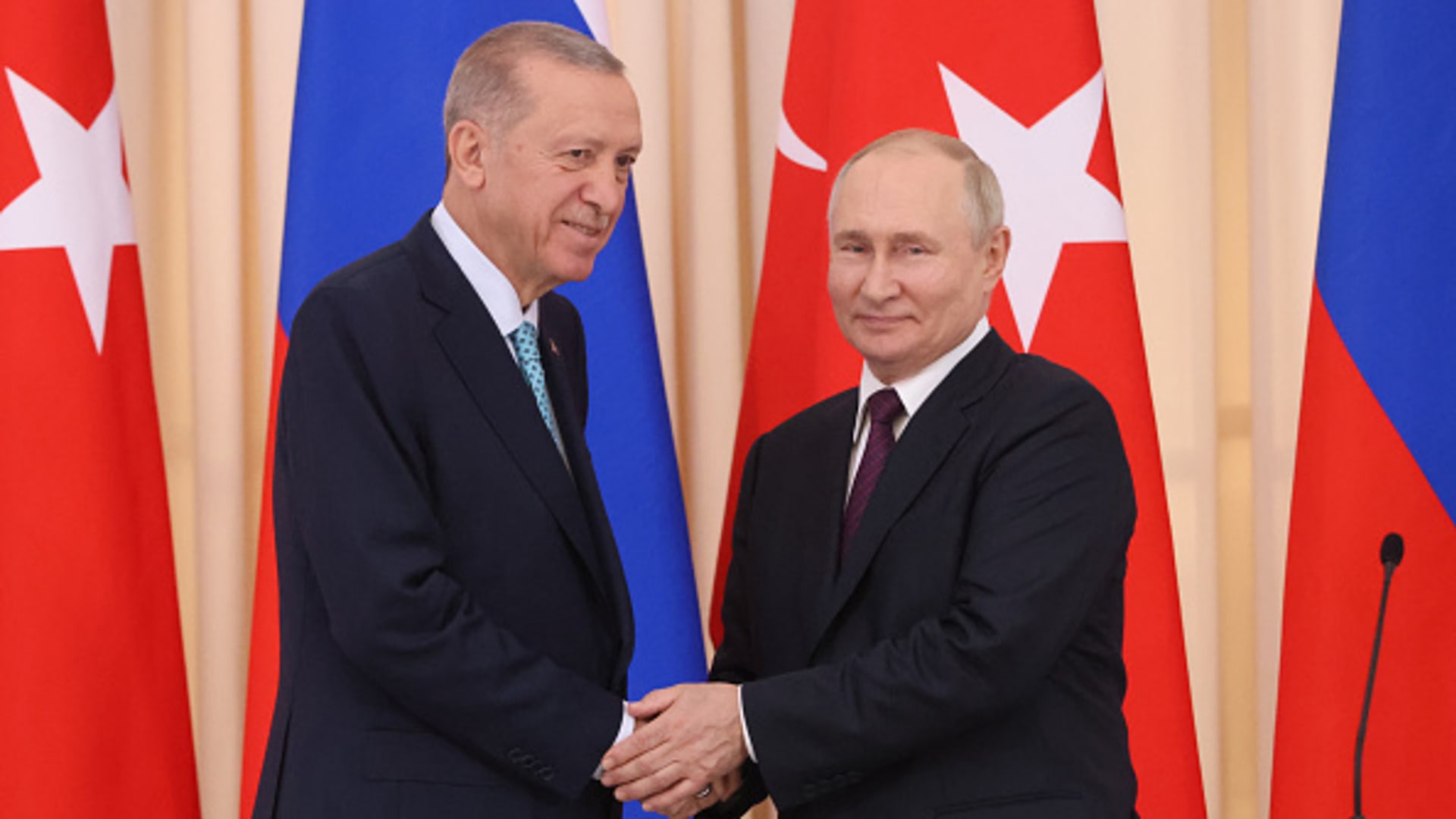Turkish Foreign Minister Hakan Fidan attends the BRICS+ session on a two-day BRICS foreign ministers summit held in Nizhny Novgorod, Russia on June 11, 2024.
Sefa Karacan | Anadolu | Getty Images
Turkey’s request to join the BRICS alliance is a move seen as both strategic and symbolic as the Eurasian country of 85 million makes increasing strides in its influence and leverage on the global stage.
“Our president has already expressed multiple times that we wish to become a member of BRICS,” a spokesperson for Turkey’s leading AK Party told journalists earlier in September. “Our request in this matter is clear, and the process is proceeding within this framework.”
BRICS, which stands for Brazil, Russia, India, China and South Africa, is a group of emerging market countries that seek to deepen their economic ties. This year, it gained four new members: Iran, Egypt, Ethiopia, and the UAE.
It’s also seen as a counterweight to Western-led organizations like the EU, the G7 and even NATO, although it lacks formal structure, enforcement mechanisms, and uniform rules and standards.
For Turkey, a longtime Western ally and NATO member since 1952, the move to join BRICS is “in line with its broader geopolitical journey: positioning itself as an independent actor in a multi-polar world and even becoming a pole of power in its own right,” George Dyson, a senior analyst at Control Risks, told CNBC.
“This is not to say that Turkey is turning away from the West entirely,” Dyson added, “but Turkey wants to foster as many trading ties as possible and pursue opportunities unilaterally without being constrained by Western alignment. It is definitely symbolic in that Turkey is demonstrating exactly this — that it is not constrained by its good ties with the West.”
Diversifying alliances
Despite decades of being aligned with Europe and the U.S., Turkey has faced consistent rejection from joining the EU, which has long been a sore spot for Ankara.
Ambassador Matthew Bryza, a former White House and Senior State Department official currently based in Istanbul, said that Turkish President Recep Tayyip Erdogan and his government “seem to be motivated mostly by two factors: A strategic tradition of securing national interests… and a desire to spook the West a bit, both out of emotional spite and as a negotiating tactic to extract concessions.”
CNBC has contacted the Turkish presidency’s office for comment.
Turkey has in the last few years expanded its role in global diplomacy, brokering prisoner swap deals and leading other negotiations between Ukraine and Russia, for instance, while also mending previously strained relations with regional powers like Saudi Arabia, the United Arab Emirates and most recently, Egypt.
Russian President Vladimir Putin shakes hands with Turkish President Recep Tayyip Erdogan during their joint press conference on September 4, 2023, in Sochi, Russia.
Getty Images News | Getty Images
Ankara also refuses to partake in sanctions against Russia — a stance that irks its Western allies but helps it maintain an independent position as a so-called “middle power,” which it sees as beneficial to its relationships with China and the Global South.
To that end, “any new BRICS member is obviously eager to take advantage of stronger ‘togetherness’ of emerging economies in order to reduce dependency on developed economies, mainly the United States,” said Arda Tunca, an independent economist and consultant based in Turkey.
Standing up to the West?
Tunca noted, however, that Turkey’s unique position in the world is a “delicate discussion point” as the country has “serious political problems with the EU and the United States” despite its western alliances.
Turkey’s governing party, which has run the country for 22 years, is “ideologically closer to the East than the West,” Tunca said. “Turkey wanted to hop on the BRICS train before it was late. It is too early to mention that the BRICS can become an alternative to the West, but the intention is clearly to stand up against the West under the leadership of China.”
Importantly, being part of BRICS allows its members to trade in currencies other than dollars. This aims to reduce dependency on the U.S.-led system and usher in a more multi-polar world. The fact that it’s led by China makes some in the West wary, who see this as a potential win for Beijing.
Turkish President Recep Tayyip Erdogan (not seen) is welcomed by Chinese President Xi Jinping as part of the 11th G20 Leaders’ Summit in Hangzhou, China, on September 3, 2016.
Mehmet Ali Ozcan | Anadolu Agency | Getty Images
“I don’t think there is any enforcement of their [BRICS’] decisions, it’s more of a geopolitical thing, sort of a symbolic counter to the G7,” Dyson said. He also noted: “It’s interesting that Iran and UAE are both in it. It’s a bit like the anti-West team.”
Erdogan has spoken of his desire to join BRICS since at least 2018, but the issue was never formalized. In June, Turkish Foreign Minister Hakan Fidan visited both China and Russia, the latter for a BRICS+ summit, during which Russian President Vladimir Putin said he “welcomed” Turkey’s interest in joining the bloc.
At the time, the then-U.S. ambassador to Turkey, Jeff Flake, said in an interview that he hoped Turkey wouldn’t join the group, but added that he did not think it would negatively impact Turkey’s alignment with the West.

 Accounting1 week ago
Accounting1 week ago
 Personal Finance1 week ago
Personal Finance1 week ago
 Accounting1 week ago
Accounting1 week ago
 Finance1 week ago
Finance1 week ago
 Economics1 week ago
Economics1 week ago
 Economics1 week ago
Economics1 week ago
 Economics1 week ago
Economics1 week ago
 Personal Finance1 week ago
Personal Finance1 week ago























